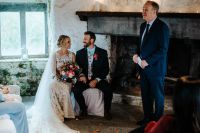Pros and cons of a legal wedding in Ireland

Cons
We always advise our couples to have a simple legal ceremony in their home country before flying to Europe for a destination wedding.
Apparently, we are leaning towards a symbolic rather than a legally-binding ceremony when it comes to a destination wedding in Europe. The reason behind this is very simple. We want our couples to enjoy their once-in-a-lifetime wedding experience in Europe without worrying about the legal paperwork.
Needless to say, it is more complicated to have a legal wedding outside your home country. You will need to submit some documents and comply with legal requirements, and there are venues in Europe that are not licensed to hold legal weddings. So if you’re opting for a legal wedding in Ireland, your options for a venue will be limited.
Even if you get legally married here, you will still need to submit some papers and go through some processes in your home country so that your wedding in Europe can be recognized.
Pros
However, there are pros to having a legal wedding in Ireland too. Compared to other countries in Europe like Germany and France, there are fewer requirements for foreigners wishing to marry here.
For example, it’s not required that one of the couples must have resided in Ireland for some time. It’s possible to have a legal wedding here even if it’s the first time you’re visiting the country.
You also don’t need to have a property or a relative living in Ireland to qualify for a legal wedding here. For more information on the precise requirements of a legally-binding wedding in Ireland, read the next section.
Paperwork required for a legally-binding wedding in Ireland
To have a legally-binding wedding in Ireland, you must submit a marriage notification to the Registrar. Documents must arrive at the Registrar's office within the required deadline to be accepted, so postal times must be considered too.
Although the submission is usually required to be made in person, non-residents are granted permission to submit copies of their documents by post. Take note that although the marriage notification can be sent via post, the couple is required to attend a face-to-face meeting with the Registrar before their wedding day.

Detailed process on the requirements for a legal wedding in Ireland
One of the key elements of our elopement package in Ireland is our planner’s help with legal paperwork. We will personally guide you through each step of the process although, for most, if not all the requirements, you have to personally comply with them.
If you're getting married in Ireland, here are the requirements for a legally-binding wedding ceremony:
-
Send in your application to the Registrar a minimum of 3 months before your wedding day;
-
Meeting with the Registrar in person at least 5 calendar days before the wedding;
-
Having two witnesses present at your ceremony;
-
Make sure your chosen ceremony location is licensed to hold legally-binding weddings.

How our local wedding planner in Ireland can help
Although the required documents and the deadlines are already discussed in the previous sections, it can still get confusing to comply with all of these, that’s why our wedding planner in Ireland is here to assist you.
Here are the things that we can help you with:
-
Ensuring that the venue is approved for legal ceremonies;
-
Finding alternative venues in case your chosen venue is not approved for legal ceremonies.
Take note, however, that our planners cannot submit the legal papers on your behalf as it is a legal process that the couple must do by themselves. You must submit the legal papers directly from where you are to the Registrar, by post.
We also cannot make arrangements for the personal meeting with the Registrar because it’s something that the couple needs to arrange directly.
For more personalized assistance on your legal wedding in Ireland, you can add legal paperwork as an item in your elopement package. This way, our planner can provide an information pack to assist you.
Our Irish planner will also be there for guidance throughout with add-on legal paperwork. She can provide sheets to send through to give you an overview, and direct links to all the forms that you need to complete.
If you’re planning to travel to Ireland weeks before your wedding day and you have accommodation booked, our planner can also let you know where the nearest registrar's office is so you can plan your trip there for the in-person meeting.
The best thing about the legal paperwork assistance is that you’ll have someone to ask questions to throughout the process as it can be confusing at times.

Other options for your wedding ceremony in Ireland
If you don’t want to go through all the paperwork and processes of a legal wedding in Ireland, you can have a different ceremony that is equally beautiful despite not being legally binding. Below are some of them.

Symbolic wedding
As the name suggests, this kind of ceremony carries no legal weight. It is commonly called a ‘blessing ceremony’ whereby the couple, who may or may not be already legally married, chooses to have a meaningful ceremony to celebrate their union in a non-restrictive format of their choice. The greatest advantage of symbolic weddings is that you don’t need to comply with any legal processes or submit any paperwork.
Religious wedding
One commonly preferred type of legal ceremony is a Catholic wedding in Ireland. If you’re having this type of wedding, you will be required to follow the rules of marriage as outlined by the Catholic Church. One such requirement is for the couple to undergo a pre-marital course. This type of ceremony is officiated by a Catholic Priest and can only take place in a consecrated church or chapel.
Humanist wedding
For a non-religious and non-denominational ceremony, you can hold a humanist wedding instead. This kind of ceremony provides more freedom of choice in terms of venue and traditions to be performed on your wedding day. The good news is that a few years ago, Ireland recognized this type of wedding to be legally binding! A ceremony like this is definitely more relaxed and free-flowing, with fewer requirements.
Spiritual wedding
Spiritual ceremonies have no affiliation with any religion. It’s a non-denominational wedding ceremony that is not too different from a humanist wedding. It does not follow any religious traditions and these are often officiated by a Spiritualist Union of Ireland member.
Secular wedding
The traditional meaning of a secular wedding specifies any type of non-religious or non-denominational type of ceremony. By this definition, both humanist and spiritual types of ceremonies can be considered secular.
In Ireland, secular ceremonies are those that draw format from pagan Celtic traditions, officiated by Secular Officiants, also known as Celtic Priests, who are licensed to perform legally-binding weddings in Ireland.
Final note
As we come to a close, you may be wondering if your legal wedding in Ireland will be recognized in your home country or not. The answer to this is, ‘Absolutely!’ After your ceremony here, and you’ve sent off the signed Marriage Registration Form back to the Registrar, they will post your marriage certificate within a few weeks.
What’s left for you to do is to register your marriage in your home country by taking the marriage certificate with you to the local courthouse or other government body which is responsible for the civil register in your country.
As you can see, a wedding in Ireland is feasible even if you are from the other side of the world. Go back to the legal requirements and processes discussed above if you want to start the ball rolling for your legally-binding wedding here.
Should you have any other queries, like ‘When is the best time of the year to get married in Ireland?’, ‘Can we customize our wedding ceremony and vows in Ireland?,’ and more, you can find the answers in our FAQ page.
